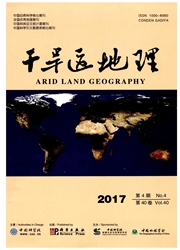

 中文摘要:
中文摘要:
以地球化学和氚(3H)同位素测年技术相结合,通过额济纳盆地地下水、地表水地球化学及同位素的研究,探讨中国西北干旱区内陆河流域下游盆地地下水地球化学演化规律和平均滞留年龄。额济纳盆地浅层地下水状况主要受地表水补给状况的影响,离河道近的水样矿化度低;而离河道较远的戈壁区,地下水矿化度高。水体化学成分主要受岩盐、石膏、白云石等矿物的溶解及蒸发作用的影响。通过利用指数-活塞模型流模型(EPM),计算出额济纳浅层地下水年龄在13-58年之间。
 英文摘要:
英文摘要:
Based on the geochemistry and tritium (3H) dating tope for the surface water and groundwater in the Ejina Basin technology, a case study of the hydrochemistry and isohas been taken up in order to understand the shallow groundwater residence time and geochemical evolution in the arid area of northwest China. The shallow groundwater quality is mainly controlled by the surface water. The samples near the river have low TDS values with SO4^2- -Mg^2+ and HCO3^ - Na^+ types,while those far from the river bed have high TDS values with SO2^- - Mg^2+ and SO4^2- - Na ^+ types. From the ion-ratio plot, the rock weathering and evaporation are dominant factors that determine the major ionic composition in the study area. In addition to the dissolution of halite,the high ratio of ( Na^+ + K^+ )/CI indicates a significant contribution of dissolved ions from silicates weathering. Another potential source of excess Na ^+ is weathering of Glauber' s salt (Na2SO4). Gypsum in anhydrite dissolution is mainly responsible for Ca^2+ and SO4^2-. Other chemical processes adding calcium is cation exchange. The high Mg^2+/Ca^2+ ratio indicates that weathering of Mgrich dolomite,which is common in the sedimentary rock in Heihe River Basin,may be involved. Most of the stable isotope δ^18O and δ^2H compositions in the groundwaters are a meteoric water feature,indicating that the groundwaters mainly source from meteoric water. Whereas,the stable isotope compositions of the samples from Gurinai swamp zone deviated from the Global Meteoric Water Line (GMWL), and may reflect enrichment due to evaporation processes. The mean residence time of the shallow groundwater ranges from 13 to 58 years, according to the exponential-piston model (EPM). The groundwater of Gurinai swamp is oldest for 58 years and groundwater in Dingxin -Laoxinmiao is youngest for 13 years and the groundwater of around Ejina capital and Bantanjing are 22 years and 20 years,respectively. The results have import implications for water
 同期刊论文项目
同期刊论文项目
 同项目期刊论文
同项目期刊论文
 Characterization of groundwater in the Ejina Basin, northwest China: hydrochemical and environmental
Characterization of groundwater in the Ejina Basin, northwest China: hydrochemical and environmental Influence of environmental, root, and stand paramenters on soil surface CO2 efflux in a Populus enph
Influence of environmental, root, and stand paramenters on soil surface CO2 efflux in a Populus enph Relationships between foliar carbon isotope discrimination with potassium concentration and ash cont
Relationships between foliar carbon isotope discrimination with potassium concentration and ash cont 期刊信息
期刊信息
